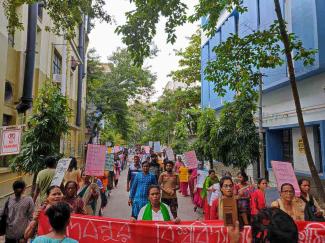An Arduous Struggle of Contract Workers of Jadavpur University: A Leap Forward!
Amidst threat and gradual degradation of the working environment, the Jadavpur University Contract Workers Union is emerging as a majority union in the University. The workers in university fought day and night to secure their minimum wage, ESI/EPF and other basic rights for the last two years.
It was in January, after numerous protest demonstrations, the general body of the union decided to go on a strike and issued legal notice to the administration. They were also fully prepared to continue the strike indefinitely if the authority refused to accept their demands. Sensing the brewing anger amongst workers, the university authorities, finally accepted major demands, including wage increment and payment and streamlining of benefits like ESI/EPF. They also agreed to issue a notice to ensure immediate disbursement of pending EPF/ESI instalments.
After a series of discussions and meetings with the authorities, it was decided that committees would be constituted to resolve the issues of policy and technical matters arising out of day-to-day work. Tripartite meetings were also planned monthly to address the grievances and to settle disputes. It was a moment of joy and happiness for workers as they never imagined such ‘miracles’ to happen in the recent times. Workers tasted the power of collectivism and cooperation that resulted in changes in working conditions.
Workers Militancy and Student - Worker Unity
In February and March, a series of tripartite meetings of university committee members, agency owners and representatives of the union were held. The representatives placed their sixteen-point charter of demands in the meeting and urged the committee to review the policies which subjugate workers to languish in inhuman conditions.
Although the university committee, comprising representatives of authorities as well as major stakeholders of the university, said to uphold the spirit of democracy, justice, and equality, they were mostly unwilling to implement the primary recommendations of the committee, which suggested that the current situation is not only untenable for workers but also snatches their democratic rights; it only benefits third-party agency owners. It was also recommended that workers be given overtime payment as per law, wage increments be streamlined, and workers be permitted paid leave for emergency purposes - these were the longstanding demands for which the union has been fighting tooth and nail.
But it took almost a month to implement the said recommendations. During that time, workers, led by the union, gathered in front of Aurobindo Bhavan, the administrative building, on numerous occasions. Often, they held sit-in protest demonstrations against the gross violation of democratic rights and unpaid overtime work. But in this process, the campus witnessed the birth of an organized force out of the unknown and often forgotten and ignored section of workers, who lead a precarious existence. They emerged as a crucial political force as they created a new language of workers’ movement – relentless struggle against contractualization and privatization in the education sector. Apart from fighting for their rights, union members frequently joined seminars and protest demonstrations against NEP, organized by students’ groups: such unity between students and workers to save campus democracy were unforeseen in the campus.
Preparing for Bigger Challenges
Definitely these achievements aren’t unprecedented, compared to the long history of organized workers’ movement in India, but if we are to consider the subalternity of the contractual workers even within the working class (compared to the permanent and high skilled workers with a relative income security) then we would see the significance of these events: these efforts partially relocate the workers from their alienated existence into the body politic and they become an active part of the whole of working class. Thus, it is not only a fight for fare wages, but it is a struggle against passivity and alienation, it is the struggle against reduction of a citizen into an abstract identity of ‘contractual worker’ and it is about reclaiming the socio-political self.
On the historic May day, the union members commemorated the martyrs of the Hay market repression in both campuses of the university and after that, workers took to the streets of South Kolkata: citizens, wayfarers witnessed a huge rally by workers raising slogans against the draconian Labour Codes. They marched with their shinning red flags and banners held high. After the culmination of the rally, the union organized a street corner meeting where leaders of other workers’ organizations and student activists addressed the gathering expressing solidarity with the ongoing movement on campus.
In the new era of working-class movement, the contractual workers are playing a significant role in reshaping the history of working-class politics globally. In our country we are witnessing the unfolding of new political mobilization in private sectors as well as in government sectors and contract workers are often spearheading these movements against central government’s anti-people policies. At a fundamental level, these movements are forming dots in different parts of the country which would in near future inevitably connect with each other to emerge as a collective resistance against the cruel exploitation by the global and corporate capital in different sectors. The struggle of workers in Jadavpur University is also snowballing into such a dot and is gearing up for a bigger battle.

